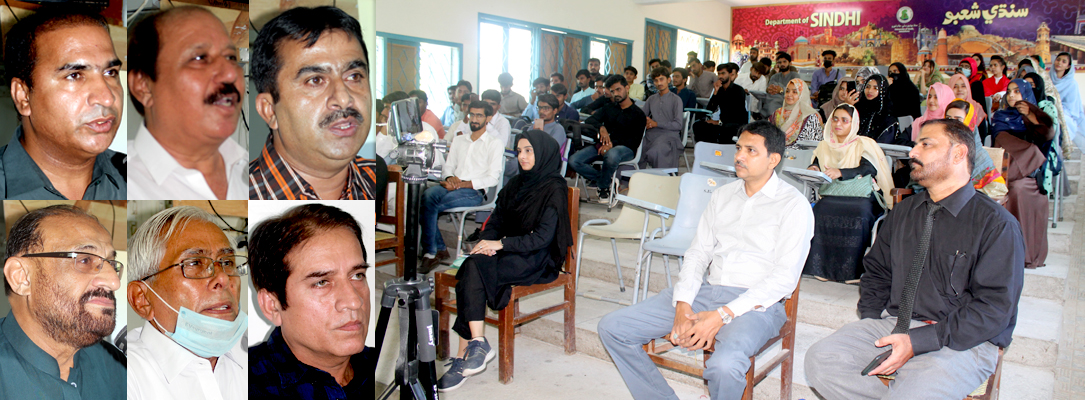
Glowing tributes paid to Mirza Kaleech Baig for his unwavering services to Sindhi language, literature by writing 461 books
Paying glowing tributes for his unwavering services for the cause of education, Sindhi language and literature, the speakers have said that Shamsul Ulema Mirza Qaleech Baig was a great writer and thinker of the world, who has not been given due recognition at the official level even in Sindh.
They termed him as a great author by saying that William Shakespeare wrote 37 dramas in English, but Mirza Qaleech Baig inked more than 461 books on 43 different subjects including chemistry, physics, biology, zoology, plant sciences, Sindhi literature and anthropology.
This they said while addressing at the 169th birth anniversary ceremony of Qaleech Baig organized by Sindh University’s Shamsul Ulma Mirza Qaleech Baig Chair in Dr. Abdul Jabbar Junejo Hall, Department of Sindhi, University of Sindh Jamshoro on Tuesday.
The Director of the Chair Prof. Dr. Nawab Kaka defined the title Shamsul Ulema as the sun of education as well as light and said that though Baig was a great scholar who led his life struggling for the cause of education, yet he was not given his due place in textbooks.
He said one could guess about his personality after seeing the volume of his books in over eight languages including Sindhi, Persian, Arabic, English and other languages.
“This is not an ordinary work to even translate such a big number of 461 books on different 43 subjects. It is a miracle. We must benefit from his write-ups”, he said.
Baig’s grandson Kazal Bash said that his grandfather was a luminous emblem of modern Sindhi literature who had served the cause of Sindhi language all his life.
He lauded Mirza Qaleech Baig’s unmatched contribution to Sindhi language & literature and said that it was unfortunate that people of Iran, England, India and Gulf countries did not know about Qaleech even in the era when the world had turned into a global village.
Writer Nafees Ahmed Nashaad said Persian had been the official language of Sindh in the Talpur era, but the language saw a gradual decline during British rule. However, he said, literary figures, mystics, historians and other scholars of Persian language could still be found in Sindh. He said native Sindhi intellectuals’ works in Persian were available in abundance.
Well-known broadcaster Naseer Mirza underlined the need for publishing more works of Baig and reprinting of published books and making arrangements for translation of his works in English, Persian, Arabic and other international languages besides Sindhi.
He said Sindh had historically been a centre of literary activities frequented by scholars from Iran, Iraq, Turkey and other countries. Firdausi had made mention of Sindh in his Shahnama, he maintained.
Chairman SU’s Department of Sindhi Dr. Noor Muhammad Shah said Mirza Qaleech was conferred with the title of Shamsul Ulema and Qaiser-i-Hind because he was one of the greatest writers, poets and historians of the subcontinent.
He went on saying that there were 461 books to his credit while he translated certain rare English and Persian books into the Sindhi language which needed to be reprinted for youth, adding that literature was essential to bring about positive change in society and promote human values.
Paying homage to the literary services of the scholar, the chairman Sindhi Language Authority (SLA) Prof. Dr. Ishaque Samejo said that Shamsul Ulema Mirza Qaleech Baig greatly contributed to Sindhi language and society.
He underlined the need for reprinting of the books of Mirza Qaleech Baig, its publication and translation of his unpublished manuscripts as well as making of his books accessible to the people and researchers through the internet.
“We all have gathered here to celebrate the birth anniversary of the personality, who has become an example and important source of encouragement for the people of Sindh”, he added.
He said that Mirza Qaleech Baig made history by writing a big number of 461 books in his short life of 76 years adding that the important thing was that the late scholar continued to work in the government till the age of 60 and also kept on writing on 43 different topics which proved that he was the center of knowledge, literature and wisdom.
Among others, well-known Sindhi poet & scholar Mor Mugheri, Muhammad Misam Baig Mirza, Dr. Fayaz Latif, Dr Rehana Nazir, Dr Shazia Pitafi, Dr. Rushdullah Shah alias Makhmor Bukhari, Nisar Mirza, Manik Mustafa Shar and Dr. Ghulam Akber Mahesar were also present on the occasion.